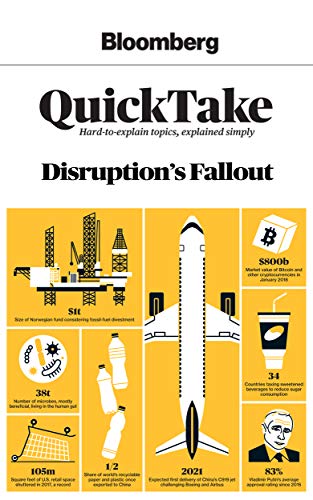You have /5 articles left.
Sign up for a free account or log in.
 Bloomberg QuickTake: Disruption's Fallout by Bloomberg News
Bloomberg QuickTake: Disruption's Fallout by Bloomberg News
Published in January of 2019.
What exactly is Bloomberg QuickTake: Disruption's Fallout?
In some ways, it is a book.
I read its 191 pages on my Kindle e-reader and on my iPhone Kindle app. While reading, I alternated between listening to the Audible version of the audiobook - through the Kindle app - and reading with my eyes.
The digital book is Whispersync enabled, which means that the words and the narration are always synched. Nowadays, about the only nonfiction books that I will purchase are those that have the Whispersync option. This significantly cuts down on the diversity of my reading, as books from university presses and others with lower potential sales are seldom Whispersync enabled.
This is an example of how the combination of digital innovation and monopolistic platforms (Amazon) can create enormous benefits (reduced friction, improved information consuming experience) while simultaneously leading to worse outcomes (less reading diversity, and the concentration of sales to fewer more popular titles).
Whispersync is a good metaphor for much of our digital information economy, including higher ed. The growth of digital e-books and audiobooks, and the growing dominance of Amazon in controlling the critical platforms and enabling technologies of this market, would have been a perfect topic for a Bloomberg QuickTake.
Alas, digital books are not covered. But there is a section on Amazon. And the bricks and mortar retail crises. And on cryptocurrency, and touch screens, and the travails of Facebook, and the demise of net neutrality. All of these topics are covered in the first chapter!
By the time the five chapters are done (in a quick 4 hours and 10 minutes if you are listening, faster if you read with your eyes), the book (if it is a book) has covered topics relating to just about everything one imagine Mike Bloomberg is pondering.
Chapters include (and I’m leaving some stuff out), the economy (trade war, short selling, Brexit, Chinese made jets), world affairs (cyberwarfare, Saudi Arabia, Putin, and Venezuela), energy and the environment (OPEC, fossil fuel disinvestment, Russian gas, recycling challenges, carbon capture), and health and society (gender pay differentials, Chinese demographics, sports betting, and guns).
In the intro to this book / non-book, the editor John Micklethwait - who you may know as the former editor of the Economist - tells us that QuickTake is a magazine. He writes:
"In a knowledge economy where ideas and information matter, conveying understanding has become more important than ever. Sometimes what's needed is an explainer, rather than a standard news story.”
Micklethwait then goes on to tell us that this QuickTake, and many other "can be found on the Bloomberg Terminal at QUICK <GO>.”
A Bloomberg Terminal costs $24,000 per year. Do you have one on your desk? Do any academics have Bloomberg Terminals? Do academic libraries subscribe to Bloomberg Terminals? Will everyone at Hopkins get a Bloomberg Terminal?
The cost for the Kindle version is $5.58. Add $7.49 if you spring for the integrated audiobook. $13.07 is pricey for a sub-200-page book, but way cheaper than $24K.
The book - or whatever it is - follows a consistent format. A topic is introduced - such as the Amazon Economy. Data are presented, usually in a graphic form. Amazon is now the second largest private employer in the US (behind only Walmart), with 560,000 full and part-time workers. The data are contextualized. Amazon accounts for 44 percent of US online sales, reaching $453 billion in 2017.
Each chapter is authored or co-authored by a different Bloomberg reporter. No central narrative or voice is running across the chapters. But somehow the chapters feel integrated and cohesive. The standard format helps. So does a data-first orientation to describing trends.
In reading this Bloomberg QuickTake, I kept wondering if there is one that could be written about higher ed?
Are we seeing the evolution of the book? One that is born digital (there is no paper Bloomberg QuickTake), created first for subscribers, and then re-purposed for digital book form?
Does Bloomberg QuickTake signal the beginning of the end of the hegemony of the author and the end of narrative?
Will digital platforms end up creating a market for books that aren’t books?
What are you reading?




